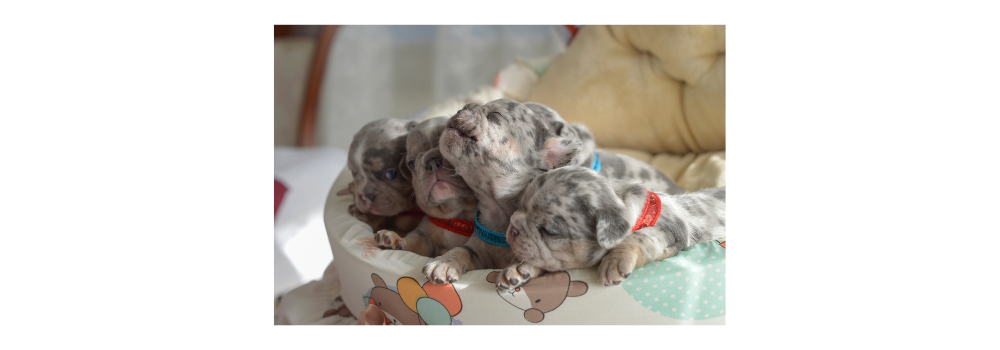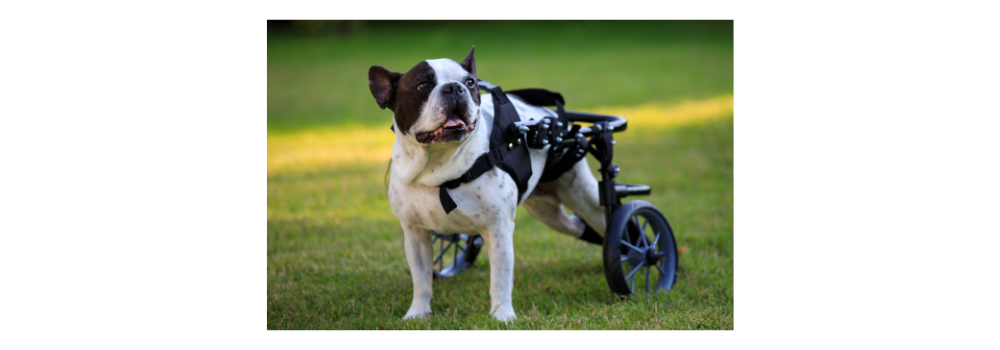
Did you know that French Bulldogs have displaced Labradors as the #1 dog in the United States? Celebrities such as Martha Stewart, Reese Witherspoon, Lady Gaga, and David Beckham are just a few of the celebrities who added one to their family.
These fun-loving clowns are the topic of a hotly debated article in Vanity Fair about their color and why some of the trendy colors that they come in, such as blue and lilac. Let's face it: people are drawn to the latest, newest, most unique cars, cell phones, and French bulldogs, apparently.
French Bulldogs are undeniably charming and affectionate companions, known for their wrinkled faces, bat-like ears, and lovable personalities. However, owning one of these adorable dogs comes with a heightened responsibility to understand and manage the unique health issues for French Bulldogs that affect the breed.
This comprehensive guide will delve into the world of French Bulldog health, covering common genetic concerns, eye problems, ear infections, spinal cord conditions, gastrointestinal issues, heart and circulatory conditions, and dental health.
My goal is to give you strategies to keep your Frenchie happy and healthy by understanding and preventing their common problems. It is also intended for those considering a Frenchie to be best prepared for ownership of this endearing breed.
What is a blue French bulldog, and why are they disqualified from showing at AKC events?

Blue French Bulldog health problems arise from the fact that they have a recessive trait that requires selective breeding for traits that make them "fad" Frenchies. Similar individuals are bred to create these unique colors and even coats for "fluffy" varieties. People are willing to pay top dollar to have a unique color or coat, and sadly, the dogs suffer as a result. This is why people are upset about dogs bred for these traits, not because of the color of their skin, as the Vanity Fair initially represents.
The cost of the average French bulldog is around $5,000 and ranges from $2,000 to $20,000 for these exotic colors. Sadly, they refer to breeders of these exotic colors as "inclusive" breeders when really what they are doing is catering to the needs of humans to make fashion statements for a higher price and a risk of increased health problems. Considering that they are artificially bred in many cases and must be born by scheduled Caesarian section makes one wonder what health disorders lie ahead in their adult life.
Not to say that all Frenchies will live a life of suffering, but sadly, so many of them do, and this is why people are upset, not because of their color. One veterinarian stated, "I don't care if they are lime green, just that they are healthy." Veterinarians are on the frontlines when people overextend themselves buying a French bulldog and find they are in for thousands of dollars in expenses to manage their health issues. In my 30 years as a veterinarian, I have seen more than my fair share of
What is an extreme brachycephalic breed?
Brachycephalic means short face, basically. French bulldogs, pugs, and English Bulldogs are considered extremely brachycephalic. Other breeds with short faces, such as Boston Terriers, Pekinese, Shi tzus, and others, have shortened facial structures, but they are much less likely to have issues. Unfortunately, French bulldogs are 17X more likely to have respiratory issues than the other brachycephalics. These respiratory issues are also more likely to crop up before the age of 2.
Key Takeaways
- French Bulldogs are prone to genetic health issues, requiring expensive veterinary care and preventive measures, especially heat stroke.
- Selecting a reputable breeder is essential.
- Pet insurance provides financial support and access to trusted veterinarians for French Bulldog owners.
- Preventing issues before they occur is key with this breed.
Genetic Health Concerns in French Bulldogs

Selective breeding predisposes French Bulldogs, along with other dog breeds, to genetic health issues. This not only increases the potential for various french bulldog health problems but also leads to costly veterinary care. According to the Royal Veterinary College, this selective breeding has caused French Bulldogs to be more prone to genetic health issues than other breeds.
Key Takeaway #1
French bulldogs can easily overheat when other dogs do not. Even temperatures in the 70's can cause them to overheat, especially if they have respiratory issues. Use care even with cooling jackets, as these can actually trap heat if they are wet.
Brachycephalic Obstructive Airway Syndrome, AKA BOAS
The snuffling and snorting coming from a French Bulldog might make you giggle, but remember, these endearing sounds could be an early sign of underlying respiratory troubles.
Brachycephalic Obstructive Airway Syndrome (BOAS) is a common respiratory disorder observed in French Bulldogs. This condition is attributed to the breed’s shortened facial structure, which causes breathing difficulties, exercise intolerance, and gastrointestinal disorders. In some cases, surgical intervention may be required to alleviate these symptoms.
French Bulldogs’ narrow trachea, nostrils, elongated soft palate, and everted laryngeal saccules contribute to the severity of BOAS. To mitigate the risk of BOAS, you can:
- Select a reputable breeder who prioritizes the health of their dogs
- Maintain regular veterinary check-ups for early intervention strategies
- Be sure to maintain a healthy weight
- Stay aware of the common health issues they may face
By following these steps, you can help reduce the risk of BOAS in your French Bulldog.
The American Kennel Club also recommends that French Bulldog owners take appropriate preventive measures, such as avoiding extreme heat and strenuous exercise, to ensure their pet’s respiratory health.
Hip and Elbow Dysplasia
Key Takeaway #2
Frenchies are top-heavy. They can easily fall out of anyone's arms and are especially vulnerable when children are holding them. They are so adorable as puppies it's hard to resist picking them up. Resist allowing children to pick them up. Instead, encourage children to sit on the floor with them as they are top-heavy and will topple out of their arms.
Hip and elbow dysplasia are genetic conditions in French Bulldogs that can result in degenerative joint disease or osteoarthritis. These conditions occur when the ball and socket joint of the hip or elbow fails to develop properly, leading to joint deterioration, friction, and pain.
Potential contributors to hip and elbow dysplasia in French Bulldogs include:
- Genetic predisposition
- Accelerated growth
- Physical activity
- Obesity
Mild cases of hip and elbow dysplasia can be treated in a number of ways, including:
- Controlled exercise: shorter walks on low-impact surfaces such as grass or sand
- Physical therapy
- Joint supplements
- Anti-inflammatories
- Joint fluid modifiers
In more severe cases, surgery may be necessary to alleviate pain and prevent further damage to the joint.
Identifying hip dysplasia early on can curtail the severity of damage and arthritis caused by the condition.
Skin Allergies and Fold Dermatitis
Key takeaway #3: Feed a minimally processed diet
French Bulldogs are prone to skin allergies and fold dermatitis as a result of their wrinkly skin. These conditions can be triggered by environmental factors such as pollen and dust mites, food intolerances, parasites, or fleas. Symptoms of skin allergies may include itchiness, redness of the skin, rashes, hot spots, hair loss, red bumps, and acne, while fold dermatitis may present as redness, soreness, smelly skin, yellow or white discharge, scratching, rubbing, or licking the affected area.
Treatment options for skin allergies and skin fold dermatitis in French Bulldogs often involve lifelong and costly management. Some treatment options include:
- Antibacterial wipes and medicated baths to treat bacterial infections of the skin (pyodermas).
- Daily cleaning of skin folds with dog grooming wipes, a damp washcloth, or unscented baby wipes.
Nutrition is the cornerstone of health for your dog. Make sure you are feeding them a diet that will not promote inflammation and contribute to allergies, ear infections, and other inflammatory conditions.
Eye Problems in French Bulldogs
Key takeaway #4
Never underestimate an eye problem in a Frenchie. Be sure to make an appointment with your veterinarian and have it looked at as they are prone to serious corneal ulcers.

French Bulldogs are prone to various eye problems, including:
- Dry eye
- Cherry eye
- Entropion
- Corneal ulcers
These issues can cause discomfort, vision impairment, and even blindness if left untreated. Preventing and managing these eye conditions can be achieved through regular veterinary check-ups and vigilant symptom monitoring.
Dry eye, or keratoconjunctivitis sicca, is a condition where tear production is reduced, causing eye sensitivity, squinting, repeated blinking, redness, and a yellow or green discharge. Treatment of this condition usually includes:
- Ophthalmic tear-stimulating drops
- Tear film replacing drops
- In certain severe cases, topical antibiotics or anti-inflammatory medications are also prescribed.
Cherry eye, a prolapse of the gland of the third eyelid, presents as a pink or red fleshy mass in the corner of the dog’s eye and is usually corrected with surgery.
Entropion, a condition where the eyelid rolls inward, can cause irritation, increased tearing, conjunctivitis, and corneal ulcers. Treatment for entropion typically involves surgical correction, while corneal ulcers may be managed with antibiotics, pain medications, and anti-inflammatory medications. In severe cases, surgery may be required to repair the affected eyelid or to treat the ulcer.
Ear Infections and Deafness

Ear infections and allergies are common in French Bulldogs due to their narrow ear canals. Symptoms of an can be quite obvious, including:
- Head scratching and shaking
- Redness of the ear
- A foul odor
- Yellow or black discharge
- Crusty or thickened ear canals
To help prevent complications, regular ear care and monitoring for symptoms are essential.
White French Bulldogs are more susceptible to deafness than other colored French Bulldogs, so it is important to be aware of this increased risk.
Spinal Cord Conditions
Key takeaway #5
Never let your Frenchie get overweight, as they are already prone to back issues. Do not delay in getting them examined if they are showing weakness in their rear or difficulty getting up. The earlier back issues are addressed, the sooner you can intervene. Delaying treatment can lead to permanent paralysis.

I was surprised to find that French bulldogs are just as likely to end up with spine issues as dachshunds. Unfortunately, dachshunds tend to fare better when they have issues versus French Bulldogs, who tend to be more severely affected by disc herniations when they occur.
Spinal cord conditions, such as hemivertebrae and intervertebral disc disease, can cause pain, nerve damage, and paralysis in French Bulldogs. Hemivertebrae is a congenital malformation of the vertebrae, which can lead to spinal cord compression and neurological symptoms.
Intervertebral disc disease occurs when the discs between the vertebrae in the spine bulge or herniate into the spinal cord space. Preventing long-term complications and improving the quality of life for affected French Bulldogs require early diagnosis and treatment of spinal cord conditions. Treatment options for mild cases of intervertebral disc disease may include pain medications, joint supplements, and physical therapy, while surgery may be necessary in more severe cases.
Hemivertebrae may be managed medically in mild cases, but surgical intervention is typically recommended when puppies are 3-4 months old.
Gastrointestinal Issues
Key takeaway #6
Frenchies are prone to regurgitation, reflux, and issues under anesthesia that can cause aspiration. Be aware of this and check out any signs of pneumonia or fever because of this susceptibility.

Gastrointestinal issues, such as chronic diarrhea, hiatal hernia, and pyloric stenosis, can affect French Bulldogs and may require lifelong management with special diets and medication. Food allergies and inflammatory bowel disease (IBD) are frequently seen as gastrointestinal issues in French Bulldogs. A hiatal hernia occurs when the diaphragm fails to develop as it should, resulting in the stomach slipping between the chest and abdomen and leading to persistent regurgitation.
Treatment options for gastrointestinal issues in French Bulldogs include dietary modifications, medication, and in some cases, surgery. Awareness of the pet’s dietary needs and sensitivities, along with regular veterinary check-ups to monitor their overall health, are key to preventing and managing gastrointestinal issues in French Bulldogs.
Heart and Circulatory Conditions

Heart and circulatory conditions, such as Von Willebrand’s Disease and pulmonic stenosis, can impact French Bulldogs and may require medical management or surgical intervention.
Von Willebrand’s Disease is a disorder characterized by impaired blood clotting, leading to excessive bleeding following an injury. Treatment for severe cases of Von Willebrand’s Disease may include blood transfusion prior to surgery and for uncontrollable bleeding episodes.
Pulmonic stenosis is a congenital heart disease in which the valve and pulmonary artery are narrowed, causing increased strain on the heart. Treatment options for pulmonic stenosis may include medication to manage symptoms or surgical intervention to widen the narrowed valve and artery. Managing heart and circulatory conditions in French Bulldogs necessitates regular veterinary care and monitoring.
Dental and Oral Health

Dental and oral health issues occur in French Bulldogs and can be managed through regular dental care and surgical correction when necessary. Teeth tend to be crowded due to a Frenchie's facial structure. Regular dental care, including brushing your French Bulldog’s teeth with a soft bristle toothbrush. Staying on top of their dental health is very important.
Tips for Preventing and Managing Health Issues

Preventing and managing health issues in French Bulldogs calls for:
- Commitment to a high-quality, minimally processed diet
- At-home care focused on dental care
- Maintaining a healthy weight to prevent obesity-related health problems
- Choosing a reputable breeder committed to health testing to ensure the puppy’s health
Selecting a reputable breeder who prioritizes the health of their dogs and provides proof of family history demonstrating no genetic health issues in the bloodline is essential in ensuring a healthy French Bulldog puppy. Unlike a typical dog, it is advised to avoid breeders who promote “rare” or “exotic” coat colors or patterns for a French Bulldog, as these may be associated with additional health risks.
It is crucial to incorporate quality ingredients into their meals, such as those found in Holistic Vet Blend products, and ensure they get enough exercise.
The Importance of Pet Insurance for French Bulldogs
Key Takeaway #7
While Frenchie ownership is rewarding, you should consider pet insurance as they are probably the most expensive family dog when it comes to veterinary bills.

French Bulldog owners should consider pet insurance essential, as it aids in covering the expenses of veterinary care and treatment for the breed’s common health issues. Some of the benefits of pet insurance for French Bulldogs include:
- Financial support for costly veterinary care
- Peace of mind knowing that your pet’s health needs are covered
- Assistance with expenses related to the breed’s specific health issues
As veterinary care can be costly, especially for a breed predisposed to various health issues, pet insurance can provide peace of mind and financial support in times of need.
The typical cost for pet insurance can vary from as little as $10 to more than $100, depending on the coverage and insurance company. It is advisable to insure your pet as soon as possible, ideally prior to their first birthday, to ensure coverage for any potential health issues that may arise throughout their lifetime.
With pet insurance in place, French Bulldog owners can focus on providing the best care for their beloved companion without the stress of unexpected vet bills. If you are going to get insurance, don't delay, as there is a waiting period for many policies, and they do not cover pre-existing conditions. While you are deciding, commit to setting money aside every month for veterinary care.
Summary
In summary, French Bulldogs are adorable and affectionate companions that require a heightened awareness of their unique health issues. Understanding and managing these issues, which include genetic health concerns, eye problems, ear infections, spinal cord conditions, gastrointestinal issues, heart and circulatory conditions, and dental issues, is essential in ensuring the overall well-being of your French Bulldog.
By taking the time to educate yourself on French Bulldog health, selecting a reputable breeder, providing regular veterinary care, and considering pet insurance, you can give your beloved French Bulldog the best chance at a happy and healthy life. Your furry friend deserves nothing less!
Frequently Asked Questions
Are French Bulldogs prone to health problems?
French Bulldogs appear to be significantly more prone to health problems than other dogs, including narrowed nostrils, obstructive airway syndrome, ear discharge, and skin dermatitis.
What is the most common health problem with French Bulldogs?
The most common health issue for French Bulldogs is brachycephalic obstructive airway syndrome (BOAS), caused by their flat faces which compress the tissues at the back of the nose and throat. Additionally, they are prone to heatstroke, sensitive skin, ear infections, birthing issues, back injuries, higher risk with anesthesia, and cataracts.
What is the life expectancy of a French Bulldog?
The average lifespan of a French Bulldog is 10-12 years. Various factors like genetics, breeding, lifestyle, and overall health play an important role in determining the life expectancy of a Frenchie.
What should you not do with a French Bulldog?
Do not expose your French Bulldog to too much heat. Be careful with exertion and vigorous exercise such as ball throwing. Additionally, do not overfeed them, as they are prone to obesity.
How can I prevent ear infections in my French Bulldog?
To prevent ear infections in your French Bulldog, feed them a minimally processed diet that would be less likely to promote inflammation. Intervene early when allergy symptoms arise and follow your veterinarian's instructions for cleaning.
Reference
(1)https://www.vanityfair.com/style/2023/11/the-french-bulldog-revolution











